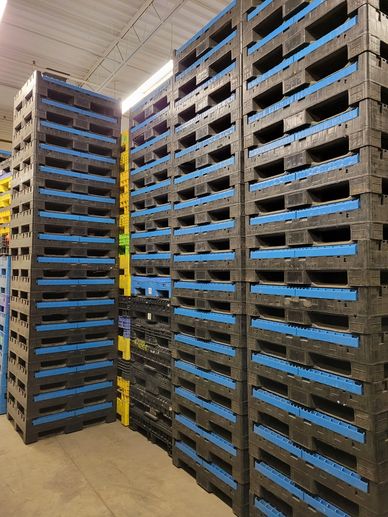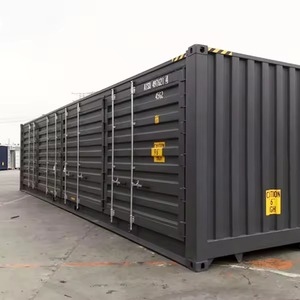Explore the versatility of used collapsible bulk containers in different industries
Wiki Article
The Ultimate Guide to Choosing the Right Bulk Containers for Your Service Needs
Selecting the proper mass containers is important for any type of service that depends on reliable logistics. Various sorts of containers exist, each developed for certain products and applications. Factors such as size, product compatibility, and governing requirements play a substantial duty in this decision-making process. Comprehending these aspects can cause improved functional effectiveness. Nonetheless, numerous organizations forget vital facets that can enhance their general efficiency and sustainability. What are these considerations?Recognizing Various Sorts Of Mass Containers
Mass containers serve as vital devices for companies seeking reliable storage and transportation solutions. These containers are available in numerous types, each designed to satisfy particular operational requirements. One typical kind is the intermediate bulk container (IBC), which is perfect for liquid and granulated products, offering an equilibrium of ability and maneuverability. Another popular choice is the mass bag, or FIBC, appropriate for completely dry, flowable products. These flexible containers are lightweight and can be quickly transported and saved. For heavier products, rigid bulk containers are usually utilized, offering sturdiness and stability for safe handling. Furthermore, there are specialized containers tailored for unsafe products, making certain compliance with security guidelines. Comprehending the distinct features of these bulk container kinds permits businesses to make informed choices that enhance logistics and minimize expenses. By picking the ideal container, companies can boost their operational performance and simplify their supply chain procedures.Secret Material Considerations for Mass Containers
When selecting bulk containers, it is vital to ponder the materials made use of in their building and construction. Aspects such as toughness, chemical, and sturdiness compatibility play a crucial duty in guaranteeing the containers satisfy specific functional needs. Additionally, weight and portability issues can impact both efficiency and transportation logistics.Product Toughness and Stamina
Longevity and stamina are essential factors in picking materials for mass containers, as they directly affect the container's capacity to withstand various environmental problems and dealing with processes. Products such as high-density polyethylene (HDPE), polypropylene, and stainless-steel are typically favored for their durable residential properties, providing resistance to impact, temperature, and abrasion changes. The selection of product likewise impacts the general life expectancy of the container; more powerful products typically result in less constant substitutes, causing cost savings gradually. Furthermore, the weight of the product can affect delivery expenses and convenience of handling. Companies need to consider their details operational atmospheres and the possibility for damage to ensure peak resilience and strength in their mass container option.Chemical Compatibility Factors
Recognizing chemical compatibility is necessary for selecting bulk containers, as the materials used have to resist the particular substances they will hold. Different aspects influence compatibility, including the chemical nature of the materials, temperature, and period of storage. For example, corrosive chemicals might call for containers made from stainless-steel or specialized plastics that stand up to degradation. In addition, responsive materials can create warm or gases, requiring aired vent or pressure-rated containers. The selection of container material, whether steel, polyethylene, or polycarbonate, need to straighten with the chemical homes of the kept compounds to stop leakages or breaches. Inevitably, an extensive examination of these compatibility variables guarantees secure handling and storage, shielding both workers and the setting while maintaining item stability.Weight and Transportability Issues
Choosing mass containers entails not only assessing chemical compatibility however additionally taking into consideration weight and portability. Organizations have to assess the ease of handling and transport to maximize performance. Light-weight products like high-density polyethylene (HDPE) or light weight aluminum can assist in much easier motion and reduce shipping expenses. Conversely, much heavier containers might supply enhanced longevity but can prevent flexibility, particularly in atmospheres needing constant moving. Additionally, the layout of the container need to enable convenient lifting and stacking, making sure ergonomic safety and security for workers. Business ought to additionally take into consideration the infrastructure offered for transport; for instance, containers compatible with forklifts or pallet jacks can streamline procedures. Eventually, the best equilibrium between weight and mobility directly affects functional performance and price efficiency.Sizing Your Bulk Containers for Optimum Effectiveness
When sizing mass containers, services need to very carefully assess the measurements needed to suit their particular products. Additionally, weight capability is a critical variable that influences efficiency and safety and security throughout transport and storage. Efficient sizing not only maximizes space however likewise maximizes operational workflows.Identifying Container Dimensions
Picking the best dimensions for mass containers is essential for maximizing effectiveness in storage and transport. Companies should evaluate their specific requirements, taking into account aspects such as offered room, the nature of the goods being kept, and the methods of transport used. Exact dimensions guarantee that containers fit ideally in warehouses and vehicles, reducing lost room and decreasing taking care of time. Standard sizes can offer ease, yet personalized measurements may be necessary for distinct requirements or to fit particular products. Additionally, it is very important to evaluate piling abilities and ease of access, as these elements influence overall operational performance. Inevitably, the appropriate measurements bring about improved company and structured logistics, benefiting the total performance of business.Weight Capacity Considerations
Understanding weight capability is essential for organizations intending to optimize their mass container efficiency. The weight capability of a container directly affects storage capabilities, transportation logistics, and total operational prices. Picking containers with the proper weight limitations guarantees that companies can safely save and transport their products without running the risk of damages or conformity issues. Straining containers can cause architectural failures, while underutilizing ability cause wasted sources. When picking containers, it is essential for businesses to analyze their item weights and take into consideration any type of regulative requirements. Furthermore, elements such as the kind of material, meant usage, and ecological conditions must likewise influence weight ability decisions. By evaluating these aspects, companies can enhance effectiveness and assure a streamlined supply chain.Governing Compliance and Safety And Security Specifications

Regulatory compliance and safety standards play an essential duty in the choice of bulk containers for services. Organizations has to ensure that their containers satisfy numerous regulations set by local, national, and global authorities. These requirements often relate to product safety, architectural check this honesty, and correct labeling, which help protect against crashes and guarantee the risk-free transport of products.
Additionally, adherence to industry-specific guidelines, such as those from the Fda (FDA) or the Occupational Security and Health And Wellness Administration (OSHA), is essential for business managing dangerous products or foodstuff. Non-compliance can cause fines, legal concerns, or damages to a company's reputation.
Organizations need to likewise take into consideration the container's compatibility with the materials being saved or transported to avoid contamination or chain reaction (used bulk containers). To sum up, understanding and carrying out regulative conformity and security requirements is vital for the liable and effective use of mass containers
Sustainability Alternatives for Eco-Friendly Mass Containers

Companies are additionally discovering alternatives made from recycled materials, which not just preserve sources but additionally sustain the recycling industry. Additionally, technologies in design enable lighter containers that need less power to transport, additionally enhancing sustainability. By incorporating these environment-friendly bulk container alternatives, businesses can demonstrate their commitment to ecological stewardship while satisfying customer demand for lasting practices. This change not only helps the world yet can likewise enhance brand reputation and consumer commitment.
Cost-Effectiveness and Budgeting for Mass Containers
While numerous companies focus on sustainability, cost-effectiveness remains a critical element when picking bulk containers. Organizations must examine the first purchase price, along with long-term operational expenses, to ensure financial viability. Elements such as reusability, resilience, and upkeep play a significant function in identifying total costs.Spending in top quality containers might generate higher ahead of time costs but can cause savings through minimized substitute rates and reduced waste. Furthermore, services should think about transportation costs and storage performance, as these can impact the overall budget.

Regularly Asked Concerns
Exactly how Do I Figure Out the Right Container for Hazardous Materials?
To establish the best container for unsafe products, one have to evaluate compatibility with the material, think about the container's product, check for regulatory conformity, and evaluate capability and safety and security functions to guarantee appropriate handling and storage space.Can Mass Containers Be Custom-made for Specific Products?
Yes, bulk containers can be personalized for certain products. used collapsible containers. Various functions, such as product, design, and size, can be tailored to meet special requirements, making sure excellent safety and security and performance for carrying and storing various itemsWhat Is the Average Life-span of Different Bulk Container Kind?
The typical life-span of bulk container types varies; plastic containers last 5-10 years, metal containers 10-20 years, and wooden containers usually last 3-7 years, depending upon usage, maintenance, and environmental conditions.How Should I Tidy and Maintain Mass Containers?
To clean up and maintain bulk containers, one must frequently evaluate for damage, remove residue, laundry with proper cleaning agents, wash extensively, and guarantee correct you can look here drying out prior to storage. Following producer standards improves longevity and safety and security during usage.Exist Rental Choices for Bulk Containers Available?
Yes, countless business supply rental choices for mass containers, providing versatility for services. These leasings can accommodate different requirements, enabling business to handle supply successfully without the dedication of buying containers outright.Durability and stamina are crucial elements in choosing materials for bulk containers, as they directly influence the container's capability to endure numerous environmental conditions and managing procedures. Comprehending chemical compatibility is essential for selecting mass containers, as the materials utilized need to withstand the specific substances they will hold. Recognizing weight capacity is crucial for companies aiming to enhance their bulk container efficiency. Governing conformity and safety and security criteria play a crucial function in the option of bulk containers for companies. While numerous businesses concentrate on sustainability, cost-effectiveness remains a critical factor when picking bulk containers.
Report this wiki page